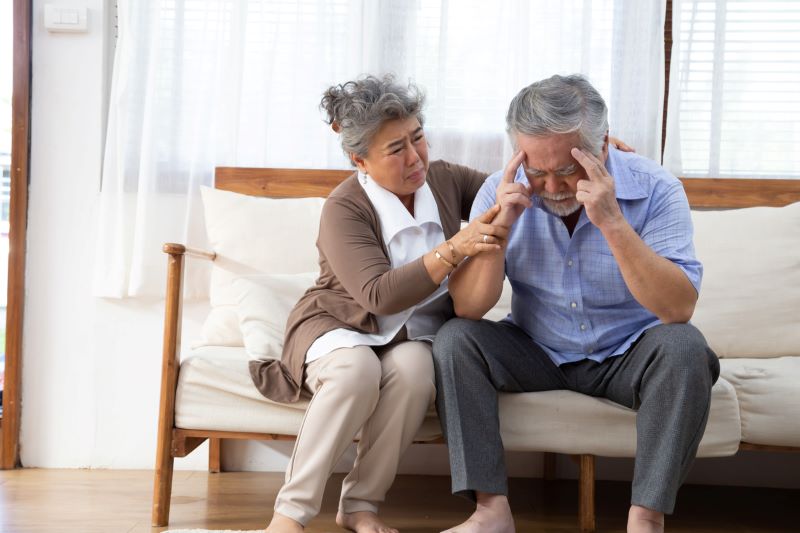Sundown syndrome is a term used to describe a behavioral change in people with Alzheimer’s Disease or other similar neurological conditions. The official sundown syndrome definition describes a state of confusion that usually takes place in the late afternoon, but it can continue into the evening hours.
Sundown syndrome is not a disease itself, but rather a group of symptoms that affect people with other dementia-related issues at consistent times of day. A person with sundowning symptoms may become agitated, have increased confusion, have trouble sleeping at night, and sometimes display aggressive behavior.
Haven Health provides caring support for all types of healthcare needs. Contact us today for more information about how we can help.
What Are the Causes of Sundowning?
Unfortunately, the exact cause of sundown syndrome1 isn’t clear. Some theories suggest it is more common in seniors who are experiencing fatigue. The National Institute on Aging2 believes this condition is also caused by an interruption in the body’s biological clock.
Most often, sundowning is seen in people who have mid to late-stage Alzheimer’s Disease or dementia. Data from the Alzheimer’s Association states that up to 20% of people3 with Alzheimer’s Disease may experience sundown syndrome.
People dealing with sundown syndrome often have trouble discerning between what is reality and what is a dream or figment of the imagination. This confusion can lead to seemingly erratic behavior or emotions.

What Factors Aggravate Sundowners Syndrome in Elderly People?
There doesn’t have to be a trigger for sundown syndrome to occur, but many elderly people have other ongoing issues that can aggravate this condition. Internal changes or external stimuli may contribute to sundowning. Some of these triggers include:
- Illness or infection (such as a urinary tract infection)
- Low lighting or dimming of the room they are in
- An increase in shadows
- The inability to discern between reality and dreams
- Disruption in the person’s internal clock
- Fatigue
- Alcohol
- Medication
- Jet lag or changing time zones
What Are the Typical Sundowning Symptoms?
Symptoms can range from very subtle changes to more intense behavior in the afternoon and evening hours. The more severe the symptoms, the longer they will usually last each day. Some people may experience sundowning for an hour or two as they adjust to the change in time, while others may experience ongoing symptoms lasting for longer periods.
Family caregivers should watch for symptoms that include:
- Sudden changes in mood
- Unexplained anxiety
- Feeling upset or sad without reason
- Surges of energy
- Hallucinations
- Confusion
- Pacing or wandering
- Rocking back and forth
- Aggressive behavior that includes screaming and violence

If a loved one suffers from sundowning syndrome, it can be challenging. Contact our skilled nurses today to learn how we can help.
What Medications Are Used for Sundowners Syndrome?
There are a number of remedies that can be used to treat the symptoms of sundowning syndrome. Various therapies, routines, supplements, and medication may be helpful to prevent occurrences of sundowning. Here are some treatment options your doctor may prescribe:
1. Mild Supplements
One form of medication prescribed may include natural remedies such as melatonin or cannabinoids.
2. Potent Prescription Medications
Something stronger may be needed to address more severe symptoms and keep the patient safe. Antipsychotic medications, antidepressants, and benzodiazepines are all common treatment options that a doctor can prescribe after a thorough evaluation of symptoms.
3. Non-Medication Approaches
These solutions to sundowners are very safe and often effective for treating symptoms. Daily physical activity, maintaining a routine, music therapy, aromatherapy, and bright light therapy have all been used with success. It often takes experimenting through trial and error to determine what works best for a person.

What Are Tips To Help Reduce Sundown Syndrome Dementia Symptoms?
While medication can be prescribed to treat specific symptoms, other efforts may be successful in minimizing the issues, such as:
- Observing what a person’s triggers are. Watch to see if symptoms appear when the person is tired or at a certain time of the day.
- Maintaining a routine is incredibly important. Structuring activities throughout the day can help keep the internal clock in sync. It’s a good idea to keep the first half of the day busy while the second half of the day can be used for relaxation and winding down close to bedtime to promote better rest at night.
- Skipping naps during the day. Sleeping only at night can help keep the internal body clock in sync.
- Managing the sleep environment. keep it simple and without added stimulation. Night lights may be helpful to deter disorientation that can occur in complete darkness.
- Using distractions. A favorite object, snack, or activity may be able to keep some of the symptoms at bay. There’s no benefit to arguing about the reality of the situation, so see if you can get the person to focus on something else for a bit.
- Implementing light therapy. Since symptoms have a lot to do with light exposure, light therapy keeps the person’s internal body clock and hormone levels at consistent and healthy levels.
People with dementia will often be aware that something isn’t right with their behavioral patterns. Paying attention to behavior changes may help caregivers prevent sundowning episodes and plan daily routines accordingly.
Many patients with sundowning symptoms are also dealing with Alzheimer’s Disease or dementia. Underlying conditions can add to the confusion, anxiety, and disorientation that these symptoms cause. Sticking to a consistent routine is extremely beneficial
Alzheimer’s Memory Care at Haven Health
It can be difficult to ask for help or medical advice from a professional when your loved one’s sundowning symptoms become too difficult to deal with. However, it’s important to remember that there is help for you and your family.
Haven Health is here to offer support and provide options for you and your loved ones. Dealing with sundowners or dementia symptoms can be very challenging, and extra help is sometimes necessary. Our caring professionals are here to answer your questions about our Alzeheimer’s memory care services or assisted living facilities. Contact us today to learn more.

Sources:
1Graff-Radford, J. (23 April 2019). Sundowning: Late-day confusion. The Mayo Clinic. Retrieved 1 March 2022.
2National Institute on Aging. (17 May 2017). Tips for Coping with Sundowning. Retrieved 1 March 2022.
3Canevelli, Marco et al. (27 December 2016). Sundowning in Dementia: Clinical Relevance, Pathophysiological Determinants, and Therapeutic Approaches. Frontiers in medicine vol. 3 73. Retrieved 1 March 2022.